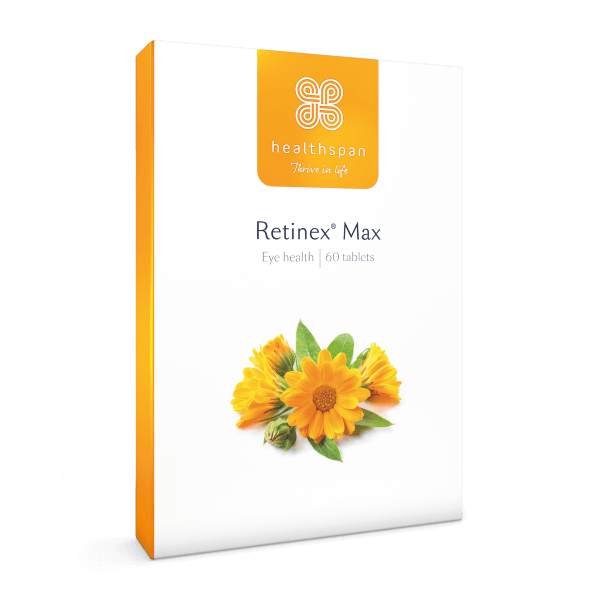Sight is one of our most precious senses, yet we often take our eye health for granted. Many of us find it hard to believe that we could lose it one day, but as we get older the risk of poor eyesight increases.
Conditions such as cataracts, glaucoma and age-related macular degeneration are the most common causes of poor eyesight. Although they are all part of the normal ageing process, there are things you can do to keep them at bay – including eating!
Age-related macular degeneration (AMD)
What is it?
AMD is a painless, gradual disorder and is one of the most common causes of sight loss in later life. It is associated with reduced levels of carotenoid pigments in the macula – the part of the retina responsible for fine vision. AMD typically eliminates words when reading and blanks out faces when you look straight at them.
What causes it?
The macula contains two yellow pigments known as 'lutein' and 'zeaxanthin'. These pigments help to filter out harmful blue light and neutralise the damaging chemicals it produces during light detection. When your levels of these pigments decline, the rate of cell damage increases and can lead to a widening circle of visual distortion.
Eat to beat it:
People with the highest dietary intakes of lutein, which is found in dark-green, yellow and orange fruits and vegetables, have at least a 60 per cent lower risk of developing AMD than those with low intakes. Until recently it was thought that any damage caused by low intakes of lutein was irreparable. However, research published in Optometry, the Journal of the American Optometric Association, shows that taking lutein supplements (10mg daily, or five times the average daily intake from diet alone) can improve vision in some cases of AMD.
Combination supplements that include lutein, zeaxanthin, antioxidants (zinc, vitamin C and vitamin E) and omega 3 fish oils are often prescribed by ophthalmologists to help prevent or treat AMD.

Retinex Max
'Nature's sunglasses' containing lutein and zeaxanthin
- Contains 20mg lutein and 2,000mcg zeaxanthin
- Powerful carotenoids found in high concentrations in the eye
- Supports long-term eye health
Cataracts
What is it?
Cataracts are an opacity in the normally crystal-clear lens. They are caused by changes in proteins that are similar to those which turn cooked egg white from clear to cloudy. This results in blurring, sensitivity to sun glare, changes in colour perception and seeing halos around light.
What causes it?
Cataracts are part of the ageing process and are made worse by exposure to ultraviolet (UV) light.
Eat to beat it:
People with the highest dietary intakes of antioxidants found in brightly coloured fruit and vegetables are less likely to develop cataracts than those with low intakes. Vitamin B2, found in eggs and oily fish, helps to maintain eye levels of an important antioxidant, 'glutathione', which may prevent cataracts forming.
Presbyopia
What is it?
Presbyopia is a form of long-sightedness that develops as part of the normal ageing process. Each eye lens thickens, making it increasingly difficult to focus on near objects. The first symptoms usually occur around the age of 45, when you may need to start wearing glasses for activities such as reading or sewing.
What causes it?
There is little that can be done to prevent presbyopia due to the fact that the lens grows throughout life, while the eye stays a fixed size. Eye muscles are therefore less able to change the lens shape by constricting or relaxing.
Eat to beat it:
For general lens health, eat plenty of fruit and vegetables for their antioxidant content.
Glaucoma
What is it?
Glaucoma is a condition in which the fluid pressure in the eye reaches such a high level that it causes damage.
What causes it?
Too much pressure squashes the small blood vessels that nourish the optic nerve, which can lead to loss of vision or even blindness. It is the most common eye disorder in people over 60 and is responsible for 15 per cent of cases of blindness in the UK.
Eat to beat it:
Berries are a rich source of antioxidants, especially vitamin C, which is involved in collagen production.
Dry eyes
What is it?
Dry eyes relatively common, especially if you work on a computer screen, suffer from diabetes or arthritis, and in post-menopausal women. However, due to reduced tear production, which becomes more common with age, some people can suffer from dry eyes all the time.
What causes it?
Dry eyes occur when the tear ducts cannot produce enough tears to moisturise the eye.
Eat to beat it:
Typical treatment involves eye drops known as artificial tears. These can be successful but may need to be used frequently to prevent burning, itching, grittiness and painful ulceration.
Increasing your intake of oily fish, taking an omega 3 fish oil supplement or an omega 7 supplement may help.






